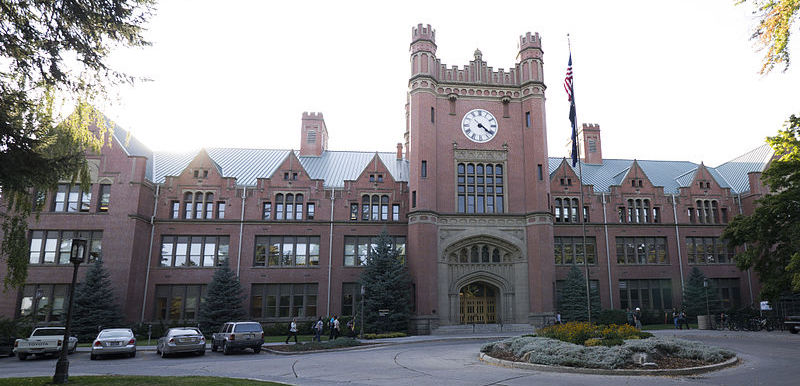Judge blocks no-contact orders against Christian law students who discussed opposition to same-sex marriage

The University of Idaho Administration Building. Photo by Davidlharlan, CC-BY-SA-3.0, via Wikimedia Commons.
A federal judge has ordered the University of Idaho to rescind no-contact orders against three Christian law students who expressed their views against same-sex marriage at an LGBTQ event and a meeting concerning ABA accreditation.
Chief U.S. District Judge David C. Nye of the District of Idaho issued a preliminary injunction June 30 that blocks the no-contact orders against the students, who were members of the school’s chapter of the Christian Legal Society.
Nye said the students had shown a likelihood of prevailing on their argument that the university violated their First Amendment free speech and free exercise rights and their 14th amendment right to due process.
The students were represented by Alliance Defending Freedom, a conservative Christian legal advocacy group, according to a July 1 press release. They sued after the university ordered them to have no contact with a law student, Jane Doe, who questioned the group’s views against same-sex marriage during the April events.
One of the Christian law students, the president of the Christian Legal Society chapter, had left a note on Doe’s carrel telling her to “feel free to come talk” with him if she had anything to say or questions to ask. The message included a smiley face.
The university also issued a limited no-contact order against law professor Richard Seamon after the lawsuit was filed, but he did not join the request for a preliminary injunction. Seamon was a faculty adviser to the Christian Legal Society and had contacted Doe by email, at first to express concern for her well-being and a second time to see whether she wanted to speak with him.
The Christian law students had attended the LGBTQ event, which took place to express support for all students, in response to an anti-LGBTQ slur left on a whiteboard, according to the statement of the allegations in Nye’s opinion. The Christian students had gathered in prayer to show support for the LGBTQ community. At the end of the prayer, Doe approached the Christian students and asked why their group’s constitution says marriage is between one man and one woman.
One of the Christian students, Mark Miller, said the group adhered to the traditional biblical view of marriage and sexuality, and that the Bible condemns homosexuality and other sins. Seamon was said to have affirmed Miller’s explanation. Doe stated her disagreement with their views.
Christian student Peter Perlot, who has since graduated, left the smiley face note in Doe’s carrel shortly after the event.
The second event regarding ABA accreditation of the law school happened a few days later. At the event, the plaintiffs say, Doe and others raised concerns that members of the Christian Legal Society had religious beliefs that were bigoted and anti-LGBTQ.
Christian student Ryan Alexander responded that the biggest instance of discrimination that he had seen on campus was against the Christian Legal Society, which the administration had failed to recognize and register in a timely manner.
Doe had contended that the students’ actions at the events left her feeling “targeted and unsafe.” She interpreted the note left in her carrel as an effort to “proselytize about extreme hateful religious dogma,” according to university defendants. And she said in an email to Seamon that the Christian group had subjected her to “violent verbal abuse,” which left her fearing for her life, her grades and her law school career.
The university’s Office of Civil Rights and Investigation had issued the no-contact orders, which applied on and off campus and permitted exceptions if the Office of Civil Rights and Investigation gave advance permission.
Nye said the no-contact orders were issued “with almost no due process,” they were based on the content of the students’ speech, and they showed “hostility to religious people and beliefs and thus flunk neutrality.”
“Some may disagree with plaintiffs’ religious beliefs,” Nye wrote. “Such is each person’s prerogative and right. But none should disagree that plaintiffs have a right to express their religious beliefs without fear of retribution.”
The case is Perlot v. Green.
Hat tip to Inside Higher Ed, Original Jurisdiction, the Volokh Conspiracy and the Moscow-Pullman Daily News, which have coverage of the decision.



